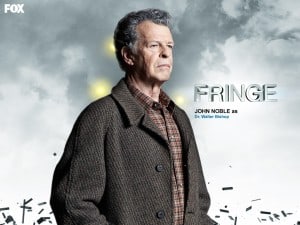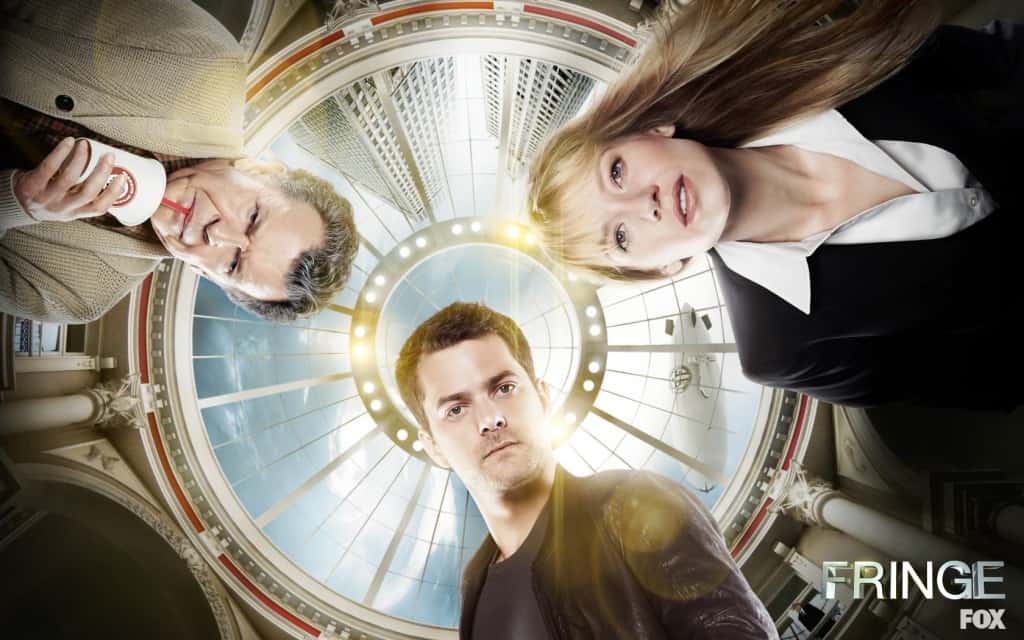Two weeks ago FOX concluded its five-year run of its twisty scifi show FRINGE. For the uninitiated, FRINGE focused on an FBI agent, Olivia Dunham, tasked with investigating fringe science phenomenon. Like LOST, it had a bigger picture mythology, too, about the damage a scientist did to the universe, alternate dimensions and spooky bald men in suits (called Observers) who seem to be everywhere all the time. (I’ll say more about all that in the paragraphs that follow. But beware: Spoilers ahoy!)
I can’t say I found the idea of FRINGE terribly attractive at the outset. It looked very much like yet another monster of the week show. And what’s worse, the story’s dilemma always circled back to the characters’ issues. Now, judging by 99% of what’s been on TV in the last 20 years, that’s otherwise known as good writing, but it has often struck me as false and lazy. I love GREY’S ANATOMY far more than I probably should (I could watch Meredith and Derek do nothing but cuddle for way too long), but every time Meredith gets a patient that makes her reconsider her own not-really-that-major struggles, I shudder. Hey, Ally McBeal, that guy in the hospital just died. Whether or not you and Derek have a baby? Really not the same thing. (And don’t even get me started on PRIVATE PRACTICE. Addison might as well be talking to a mirror every episode. Ugh.)
When I finally did give the show a shot, there were three things that hooked me, the same three great traits of FRINGE that I’ll miss.
1. FRINGE is a show about a father’s love for his son — People love to compare FRINGE to the X-FILES. And beyond the obvious monster of the week similarity, both shows also emerge from the same broken heart. Fox Mulder is driven not by some abstract interest in conspiracies or the possibility of aliens, but by the abduction of his sister. And on FRINGE, what lies behind almost every crazy scifi crisis they face, is the horrific grief experienced by main character, scientist Walter Bishop, as he watched his young son Peter die, and the choices he made as a result.
But where X-FILES used that experience of loss to travel to a very dark and lonely, paranoid place, FRINGE instead built a world shattered by one’s own sins and desperate in its pursuit of redemption. So much of the story is about the madness of being a parent, the truly insane lengths a parent will go to in order to stop the suffering of their child (and also themselves). It proved an endlessly emotional and rich engine for story. Walter loves Peter so much, he’s willing to destroy a whole other universe in order to save him.

Walter
2. Mad Scientists — Over and over during the past five years FRINGE has liked to tell stories about brilliant thinkers and engineers who went too far out of some passion or relationship. In a sense, they’re all funhouse mirror images of Walter himself, the show’s late-in-life Dr. Frankenstein, desperately trying to fix the damage he did to save his son. Like Walter, some of them are trying to put their genies back in bottles or their monsters back in cages, while others are trying to cheat the laws of physics in the first place.
3. Alternate Dimensions — People like to say that the writers of LOST had no idea where they were going, that their mysteries were just hokum meant to fool us into watching (as though they needed to know every single beat of the whole show in order to throw out some really intriguing stuff in the first season).
FRINGE was LOST turned inside out — it started with this immense secret at its heart, that there were alternate dimensions and things from each affecting the other — but rather than display it, smoke-monster-like in the series premiere, it doled that secret out so slowly you could walk away from the early episodes and have no idea that the footprints of that big idea were present. To hide the hook like that was immensely gutsy, as ballsy as David Simon’s pace on THE WIRE or TREME, or Vince Gilligan’s attention to detail on BREAKING BAD. It also probably hurt FRINGE’s ratings, but I suspect that hook will keep FRINGE one of those shows that keeps finding new audiences years from now.
FRINGE’s finale (and again, SPOILERS SPOILERS SPOILERS) was rewarding in many ways. It had wonderful callbacks to many of the major story lines of the show — the alternate dimension, Peter and Walter’s relationship, and of course the Observers, who before becoming the show’s Big Bad hovered in the background of every episode of the show (literally, in every episode of FRINGE there is a moment when an Observer walks through or watches the events – a fantastic weekly easter egg). And it had some incredibly emotional, spot on character moments.
That’s always the challenge for a scifi show, to ground itself not just in cool ideas or worlds, but character and emotions. Near the end of the finale, as Walter reveals to Peter that he’ll have to leave Peter forever in order to save the world, he grabs his son, pulls him close and whispers words every parent (or aunt or uncle, for that matter) can understand: ”You are my favorite thing. My very favorite thing.”
It kind of says it all.
***
Editor’s Note: All images from Fox Broadcasting Company.



